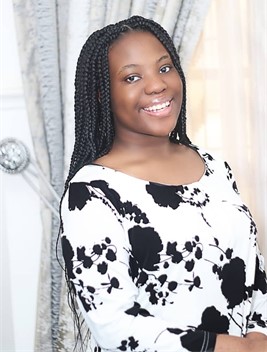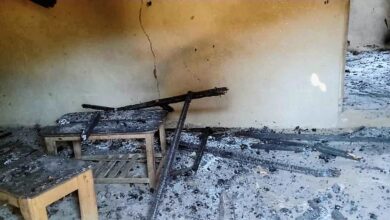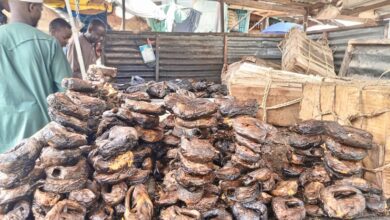Nigerian Teen Develops App To Close Gap In Mental Healthcare
Kira App, founded by a teenager in Nigeria, will provide anonymous mental health services to people who are afraid of victimisation.

When the COVID-19 pandemic first hit Nigeria in February last year, 15-year-old Samira Bello, like many others, did not know the pandemic would result in another health crisis.
As the pandemic held the world at a tailspin, with countries, including Nigeria, announcing lockdowns and travel restrictions to curb the virus’s spread, it devastated people’s mental wellbeing.
Samira was preparing for her final exams at Oxford Manor College, Abuja, when the Nigerian government shut down all schools in March 2020.
Reeling from the emergency school closure, like most high school seniors, Samira was worried about the delay it would cause for her university admission.
“I was worried it would take long for the government to reverse the order. I was uncertain if it would allow me to write my Cambridge exam in May. At first, I didn’t know what to do again,” Samira told HumAngle.
Her school runs a British curriculum, preparing final-year students only for the Cambridge Assessment International Examination.
Things changed when her friends began to open up about having suicidal ideation associated with the long wait after months of academic rigour in preparation for the exams.
“They could not tell their parents about their mental state out of fear of punishment”, she said.
Concerned about helping her friends out of the problem, Samira took an introductory course on psychology facilitated by Yale University on the online self-learning platform Coursera during the early days of the lockdown.
At the end of the course, she came up with the idea of launching a tele-psychological health provider app called Kira.

“I realised that not a lot of people are able to talk to their parents about their mental health. That is a big problem on its own.
“I wanted to make something that could let people talk about their problems while staying anonymous,” Samira said.
With a background in computer programming, she created the app to “make it easier for people to talk about their problems without feeling embarrassed.
“We’ve made it anonymous. You can also learn about your issues. However, if the user wants one-on-one interaction, we’ve listed a few hospitals they can visit.”
Samira’s vision is to drive change by raising awareness and dispelling stigmas around mental health issues in Nigeria.
Mental Health Spectrum
A 2013 research by David Kupfer, an American psychiatrist, says that mental health disorders are universal and sit on a spectrum.
According to the research, many people, at some point, will be affected by one or several of them – including depression, anxiety, bipolar disorder, schizophrenia and psychosis.
In Nigeria, these challenges have been linked to a high level of poverty, economic hardship, marital issues, stress or other pressures.
One in four Nigerians – some 50 million people – are suffering from some sort of mental illness, according to a World Health Organization (WHO) report in 2017.
The 2017 WHO report also states that Nigerians have the highest incidences of depression in Africa, with around 7,079,815 suffering from depression, representing 3.9 per cent of the population.
The report estimates that fewer than 10 per cent of Nigerians who are mentally ill have access to the care they need.
Crisis Within a crisis
When the alarm went off on a chilly December morning, Tobi, 23, beat the clock and laid awake in bed for another hour, wanting to sleep again, but it never happened.
Before the pandemic, this could simply pass as morning insomnia. But it is not. The pandemic had affected his sleeping routine such that what often keeps him awake in the morning is the feeling of ennui and uncertainty.
He has been battling depression since he was a teenager when his parents were separated. He had thought of therapy, but he never went for one.
“I didn’t feel it was necessary,” Tobi said.
“There’s this idea that if you go, especially as a man, you have a problem because you are emotionally weak, and then, you won’t be rated well,” he explained.
In Nigeria, having a mental health condition or even discussing it is hushed. The fear of stigmatisation —being labelled as mentally ill— often scares people more than they worry about their mental health. Poor societal attitude and the lack of social support continue to be barriers to seeking mental health treatment.
Tobi used to work as an assistant for an IT firm in Abuja until he was laid off in October when the Nigerian government began a partial reopening of the economy.
The pandemic, alongside associated lockdowns, put a strain on the livelihoods of people like Tobi, triggering anxiety.
According to WHO, bereavement, isolation, loss of income, and fear can trigger mental health conditions or exacerbate existing ones.
“COVID-19 has interrupted essential mental health services around the world just when they’re needed most. World leaders must move fast and decisively to invest more in life-saving mental health programmes – during the pandemic and beyond,” Dr Tedros Adhanom Ghebreyesus, the Director-General of the WHO, once said.
Now, Tobi is a freelancer working remotely from his one-bedroom apartment in Kubwa, Abuja. But his anxiety is not over yet.
“I still wake up in shock with fear of failing again. That’s why it’s often difficult to sleep again,” Tobi said.
A psychiatrist, Dr Dapo Adegbaju, says a person’s mental well-being will help him realise his potential and cope with the everyday stresses of life, work productively, and contribute to his community.
Tobi hopes to get treatment for his mental health condition with the launch of Kira.
“I’m happy I can talk to someone anonymously about my condition. I can’t wait to get the app,” he said.
Samira, who hopes to be a psychologist one day, says, “it’s fulfilling to finally contribute to something.”
Apart from her sterling academic record as a 2017 Math Olympiad winner and recipient of the Duke of Edinburgh Award, she says her entrepreneurial spirit could be traced to as early as age 9 when she opened her first business, making and selling beads.
“I made about N200,000 from that. I stopped because the demands of secondary school are different. Then at 13, my best friend and I started a business selling Tee shirts,” she told HumAngle.
In October last year, she launched a skincare line called Skin Silk by Meera a month before launching the Kira app.
Note*: name has been changed to protect the identity of the interviewee.
Support Our Journalism
There are millions of ordinary people affected by conflict in Africa whose stories are missing in the mainstream media. HumAngle is determined to tell those challenging and under-reported stories, hoping that the people impacted by these conflicts will find the safety and security they deserve.
To ensure that we continue to provide public service coverage, we have a small favour to ask you. We want you to be part of our journalistic endeavour by contributing a token to us.
Your donation will further promote a robust, free, and independent media.
Donate Here





